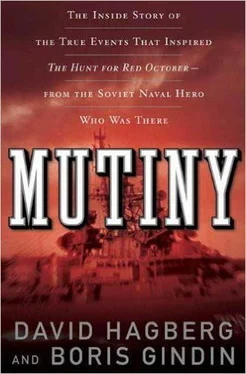But Firsov is not joining the officers leaving the midshipmen’s dining hall. His backgammon piece was white. He has voted to go with Sablin. Firsov has voted to mutiny.
“I could not believe my eyes,” Gindin says of that moment. “It felt as if a speeding train had just run through my head.” Thoughts and emotions tumble end over end in his gut. A dozen questions he hasn’t even been able to form yet are seething to the surface from some cauldron deep within his Russian soul. He feels confused, betrayed, deceived, more frightened than he’s ever been to this point in his life. Why had Vladimir chosen to side with Sablin? It made no sense. Was Vladimir completely out of his mind? Was he flustered? “Maybe he was trying to save his own life,” Gindin muses.
A couple of the officers who’d voted to go along with the mutiny get to their feet and stand beside Sablin as if the zampolit’s rank or power might protect them.
Gindin wants to ask again what has happened to the captain, but the vastness of the chasm that has opened before him and the shock of Firsov’s betrayal strike him speechless for those few moments.
One of the officers opens the door. Metal chains have been stretched across the corridor to the left and the right, blocking them from returning to their duty stations or from going up on deck. The only path for them is through an open door directly across the hall and down a companionway to the next deck below. It occurs to Gindin, and probably the others, that they are being herded like sheep. Or, more darkly, like lambs to the slaughter.
Gindin’s fear spikes, yet he doesn’t call out in alarm. Nor does anyone speak, because a stocky enlisted man holding a large Makarov is standing in the corridor just beyond the chain to the left. He is scowling, and he looks as if he means business. Sablin has promised the enlisted men the moon. He is the one officer they can trust. They will do anything for him, even kill the other officers if it comes to that. Gindin and the others read something of that from the young man’s expression.
The first officers through the door into the corridor pull up short when they are confronted by the sailor with the gun and try to turn back, creating a logjam.
Gindin spins around, but Shein has stepped out of the projector closet and he, too, is holding a big Makarov pistol in his meaty hand, and he, too, looks as if he means business. There will be no turning back. They have no other choice than to cross the hall and take the companionway stairs down to the lower deck, though what awaits them below is anyone’s guess, but Gindin is truly afraid for his life now. Not only from the authorities when word of the mutiny gets out but also from his zampolit and his armed crewmen.
Gindin makes a last, mute appeal to his roommate, but Firsov looks away. He cannot meet Gindin eye to eye. Vladimir is embarrassed, and Gindin believes that is a positive sign.
He turns back again to follow the other officers out of the midshipmen’s dining hall, and he feels a faint glimmer of hope that Firsov will come to his senses at some point and stop this madness from going any further.
It’s up to Firsov now.
Across the corridor they climb down the steep, vertical stairs about three and half meters to where another enlisted man with a pistol is waiting for them at an open door into one of the sonar parts compartments.
The situation is bizarre. No one says a word at first; no one is objecting; no one is giving orders. The officers climb down the stairs and one by one soundlessly enter the compartment.
When everyone is inside, the sailor looks in at them with utter contempt in his eyes. “Sit down,” he tells them. “Keep your mouths shut and no one will get hurt.”
Suddenly the situation is filled with high melodrama, like the American cowboy movies that the theaters sometimes show.
The sailor slams the door and dogs the latches, locking them in.
One of the officers bangs an open palm against the bulkhead. “Hey!” he shouts at the top of his lungs. “We’re in here; let us out!”
“Shut your mouth!” the sailor just outside the door shouts back. “No noise!”
“In one instant everything had been turned upside down,” Gindin says. “We were in the position of taking orders from an enlisted man with a gun. We had to obey his instructions. There was nothing else for us to do.”
Sablin’s wife, Nina, has gotten the letter about the mutiny that her husband posted four days earlier at Baltiysk, but she’s not told anyone in authority about it. So far as Moscow is concerned, nothing has happened yet, nor is anything about to happen. It’s just another day after a holiday in the Soviet Union. Tomorrow morning everyone will get back to work. Yesterday, when Seaman Shein was ashore on liberty after the parade he sent letters to his sister and best friend back home telling them what he was about to do. His biggest worry was that Sablin was actually a spy and intended to defect to the West. Probably to Sweden. In that case they would be doomed. There would be no way out of it for any of them. Shein wanted to explain that he believed the zampolit was a man of his word, who merely wanted to send a message to the Russian people about their rotten government. In return for helping him, all the sailors were promised an early out from the navy. No one wanted to be a traitor. All of them loved the Soviet Union; so Shein maintained. But all of them wanted to get out of the military and go home. Was that so terrible?
And no one was really afraid of the KGB’s retaliation after this thing was finished, if they didn’t think about it too hard. Sablin was the zampolit; his word was practically the same as a promise from the Communist Party itself.
In the West the workers have to accept the fact that there will be rich people and that there will be poor people, Sablin tells Shein and the other enlisted men. It’s a fact of life that cannot be denied. But in a socialist system all that is supposed to be different. There cannot be rich people and poor people. We’re all alike! We must all be equal!
Communism is the highest form of civilization.
“So, what has gone wrong in Mother Russia?” Sablin asks rhetorically. “There is a clear contradiction between the words and the deeds in the Soviet Union. Everyone knows this in his heart of hearts. It is up to us to talk openly about the issues. Force Moscow to listen to the hearts and minds of our people.”
“What is the use of all this stupid window dressing?” Shein asks Sablin at one point. Shein’s comment is typical of the cynicism throughout the country. “When we go to war, who are we supposed to defend with all this fancy talk?”
None of Sablin’s enlisted crew think much about the consequences of their support of the zampolit. They’re going home soon, and that’s all that counts.
Even most of the midshipmen seemed sanguine. The crew thought highly of Captain Third Rank Sablin, according to Viktor Borodai. But the captain had warned Sablin more than once about getting too close to the enlisted crew. A warning that he never heeded.
For Seaman Shein it started one evening when Sablin called him into the dining room where the political lectures were given. The enlisted man had no idea what the zampolit wanted with him, but orders were orders.
“I have a question for you, Sasha,” Sablin says.
Shein nods uncertainly. He’s never been talked to like this by an officer. He doesn’t know what to say or how to act. This is new territory for a kid from Togliatti.
“How would you like to work for the KGB?”
It’s like a hot poker has been stuck up his ass. He’s disappointed and pissed off. After everything the zampolit has taught them about honor and equality and the true meaning of Communism, now he’s recruiting his crew to be spies, informers for the KGB.
Читать дальше












